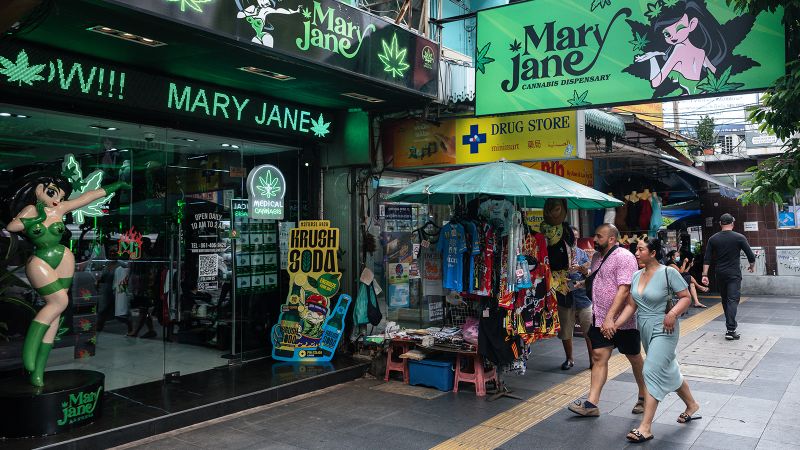BANGKOK – Three years after Thailand became the first Asian country to decriminalize cannabis, the government has introduced new regulations to curb the burgeoning “green rush.” As of Thursday, purchasing cannabis requires a doctor’s prescription, limiting its use to medical and health purposes.
Immediate Impact
The new rules mark a significant shift in Thailand’s cannabis policy, which had previously allowed widespread recreational use. Public Health Minister Somsak Thepsutin emphasized the change in stance, stating, “Cannabis is permitted for medical use only.”
Key Details Emerge
According to the Health Ministry, licensed cannabis shops can now only sell to customers with a medical prescription. These establishments must maintain detailed sales records and are subject to regular inspections. Additionally, the new regulations impose stricter controls on growers, ban commercial advertising, and prohibit sales through vending machines or online platforms.
More than 18,000 licensed cannabis shops across Thailand must comply with the new rules or face closure. Violations could result in up to one year in prison or a fine of 20,000 baht ($620).
Industry Response
The announcement comes as a surprise to many in the industry, who have enjoyed a boom in cannabis-related businesses since decriminalization. The ban on advertising could significantly alter the landscape of tourist hotspots like Khao San Road in Bangkok and beach towns such as Pattaya.
By the Numbers
A 2022 report by Thailand’s Ministry of Commerce estimated the cannabis industry could be worth $1.2 billion by 2025. However, Somsak noted there is “no clear estimate” of the industry’s current value due to unregulated transactions.
What Comes Next
While the new regulations aim to plug legal loopholes and prevent misuse, they also present challenges for businesses. Some shop owners express concern over the lack of clarity in the law and the potential impact on their operations.
“The lack of clarity in the law has already caused worry,” said Ake Khattiyadamrong, a cannabis shop owner in Chonburi province. “It’s a real shame — Thailand was one of the first countries to recognize the benefits of cannabis.”
Expert Analysis
Pro-cannabis activist Kitty Chopaka argues that the new rules won’t stop recreational use or illegal activities. “This is a knee-jerk reaction to supposedly addressing the smuggling issue,” she said.
Between October 2024 and March 2025, more than 800 cannabis smugglers were arrested, and over nine metric tons of cannabis were seized, according to the British government.
Background Context
Cannabis decriminalization in 2022 led to a surge in dispensaries and cannabis-themed businesses across Thailand. The government initially intended to regulate the industry but faced challenges due to a legal vacuum.
Meanwhile, industry experts warn that the new regulations could drive up corruption and make it harder for smaller farmers to survive. “We want to see fair access and rules that make sense,” Chopaka added.
Regional Implications
The timing is particularly significant as Thailand’s ruling Pheu Thai Party recently proposed recriminalizing cannabis, facing opposition from its coalition partner, the Bhumjaithai Party. The latest push from Somsak follows Bhumjaithai’s withdrawal from the coalition government.
Timeline of Events
2018: Medical marijuana legalized in Thailand.
2022: Cannabis decriminalized, leading to a boom in recreational use.
2024: New regulations introduced, restricting cannabis use to medical purposes.
According to sources familiar with the situation, the new regulations are just a first step, and passing a bill through parliament will take time. “This isn’t a fixed policy that can’t be changed,” Somsak said, acknowledging the need for clear laws regarding narcotics or controlled substances.
The move represents a significant shift from Thailand’s previous liberal approach, and the implications for the cannabis industry and tourism sector remain to be seen.
